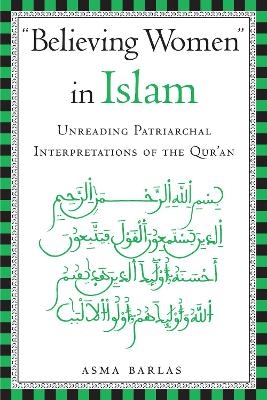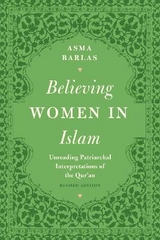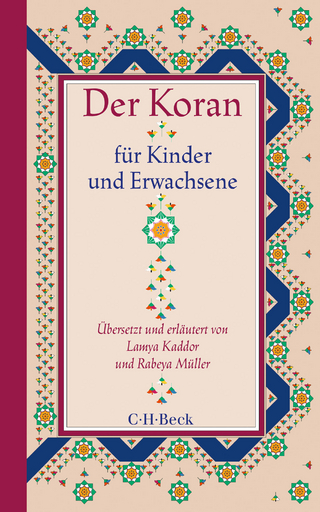
"Believing Women" in Islam
Unreading Patriarchal Interpretations of the Qur'an
Seiten
2002
University of Texas Press (Verlag)
978-0-292-70904-1 (ISBN)
University of Texas Press (Verlag)
978-0-292-70904-1 (ISBN)
- Titel erscheint in neuer Auflage
- Artikel merken
Zu diesem Artikel existiert eine Nachauflage
Beginning with a historical analysis of religious authority and knowledge, this title shows how Muslims came to read inequality and patriarchy into the Qur'an to justify existing religious and social structures and demonstrates that the patriarchal meanings ascribed to the Qur'an are a function of who has read it, how, and in what contexts.
Does Islam call for the oppression of women? Non-Muslims point to the subjugation of women that occurs in many Muslim countries, especially those that claim to be "Islamic," while many Muslims read the Qur'an in ways that seem to justify sexual oppression, inequality, and patriarchy. Taking a wholly different view, Asma Barlas develops a believer's reading of the Qur'an that demonstrates the radically egalitarian and antipatriarchal nature of its teachings. Beginning with a historical analysis of religious authority and knowledge, Barlas shows how Muslims came to read inequality and patriarchy into the Qur'an to justify existing religious and social structures and demonstrates that the patriarchal meanings ascribed to the Qur'an are a function of who has read it, how, and in what contexts. She goes on to reread the Qur'an's position on a variety of issues in order to argue that its teachings do not support patriarchy. To the contrary, Barlas convincingly asserts that the Qur'an affirms the complete equality of the sexes, thereby offering an opportunity to theorize radical sexual equality from within the framework of its teachings. This new view takes readers into the heart of Islamic teachings on women, gender, and patriarchy, allowing them to understand Islam through its most sacred scripture, rather than through Muslim cultural practices or Western media stereotypes.
Does Islam call for the oppression of women? Non-Muslims point to the subjugation of women that occurs in many Muslim countries, especially those that claim to be "Islamic," while many Muslims read the Qur'an in ways that seem to justify sexual oppression, inequality, and patriarchy. Taking a wholly different view, Asma Barlas develops a believer's reading of the Qur'an that demonstrates the radically egalitarian and antipatriarchal nature of its teachings. Beginning with a historical analysis of religious authority and knowledge, Barlas shows how Muslims came to read inequality and patriarchy into the Qur'an to justify existing religious and social structures and demonstrates that the patriarchal meanings ascribed to the Qur'an are a function of who has read it, how, and in what contexts. She goes on to reread the Qur'an's position on a variety of issues in order to argue that its teachings do not support patriarchy. To the contrary, Barlas convincingly asserts that the Qur'an affirms the complete equality of the sexes, thereby offering an opportunity to theorize radical sexual equality from within the framework of its teachings. This new view takes readers into the heart of Islamic teachings on women, gender, and patriarchy, allowing them to understand Islam through its most sacred scripture, rather than through Muslim cultural practices or Western media stereotypes.
Asma Barlas is Associate Professor and Chair of Politics and interim director of the Center for the Study of Culture, Race, and Ethnicity at Ithaca College.
* Preface * Acknowledgments *1. The Qur'an and Muslim Women: Reading Patriarchy, Reading Liberation * Part I *Texts and Textualities: The Qur'an, Tafsir, and Ahadith * Intertextualities, Extratextual Contexts: The Sunnah, Shari'ah, and the State * Part II * The Patriarchal Imaginary of Father/s: Divine Ontology and the Prophets * The Qur'an, Sex/Gender, and Sexuality: Sameness, Difference, Equality * The Family and Marriage: Retrieving the Qur'an's Egalitarianism * Postscript * Notes * Glossary * Select Bibliography * Index
| Zusatzinfo | 4 graphs |
|---|---|
| Verlagsort | Austin, TX |
| Sprache | englisch |
| Maße | 152 x 229 mm |
| Gewicht | 652 g |
| Themenwelt | Geisteswissenschaften ► Religion / Theologie ► Islam |
| Sozialwissenschaften ► Soziologie ► Gender Studies | |
| ISBN-10 | 0-292-70904-8 / 0292709048 |
| ISBN-13 | 978-0-292-70904-1 / 9780292709041 |
| Zustand | Neuware |
| Haben Sie eine Frage zum Produkt? |
Mehr entdecken
aus dem Bereich
aus dem Bereich



